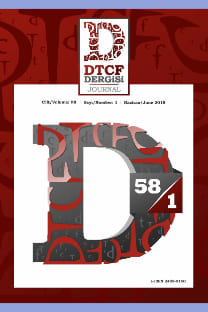A DELEUZEAN APPROACH TO CONTEMPORARY FICTION: SOME QUESTIONS
ÇAĞDAŞ ROMANA DELEUZYEN BİR BAKIŞ: BAZI SORULAR
___
Adiseshiah, Sian and Rupert Hildyard. “Introduction: What Happens Now.” TwentyFirst Century Fiction: What Happens Now. London: Palgrave, 2013. Bogue, Ronald. Deleuze on Literature. London & New York: Routledge, 2003.Boxall, Peter. Twenty-First-Century Fiction. New York: Cambridge U.P., 2013.
Deleuze, Gilles. Essays: Critical and Clinical. Trans. Daniel W. Smith. Minneapolis: University of Minnesota Press, 1997.
Deleuze, Gilles and Felix Guattari. What is Philosophy? Trans. Graham Burchell and Hugh Tomlinson. London: Verso, 2009.
Deleuze, Gilles and Felix Guattari. Kafka: Toward a Minor Literature. Trans. Dane Polan. Minneapolis: University of Minnesota Press, 2012.
Eaglestone, Robert. Contemporary Fiction: A Very Short Introduction. Oxford: Oxford UP, 2013.
Green, Jeremy. Late Postmodernism: American Fiction at the Millennium. NewYork: Palgrave, 2005.
Hoberek, Andrew. “Introduction: After Postmodernism.” Twentieth Century Literature, After Postmodernism: Form and History in Contemporary American Fiction. 53. 3 (Fall 2007): 233-247. Web. 12 March 2016.
Hodgson, Jennifer. “Such a Thing as Avant-Garde Has Ceased to Exist: The Hidden Legacies of the British Experimental Novel.” Twenty-First Century Fiction: What Happens Now. London: Palgrave, 2013.
Hughes, John. “Deleuze, Style and Literature.” Lit: Literature Interpretation Theory 21.4 (2010): 269-284. Web. 12 March 2016.
Hutcheon, Linda. The Politics of Postmodernism.2nd Edition. London: Routledge, 2002.
Huyssen, Andreas. “Introduction: Modernism after Postmodernity.” New German Critique 99 (2006): 1–5. JSTOR. Web. 28 February 2016. Lambert, Gregg. “The Deleuzean Critique of Pure Fiction.” Substance 26.3 (1997): 128-152. Web. 20 March 2016.
Latour, Bruno. “Why Has Critique Run out of Steam? From Matters of Fact to Matters of Concern.” Web. 27 March 2016.
Nicol, Bran. “Following Postmodernism.” History in Western Literature. Ed. Zekiye Antakyalıoğlu. Ankara: Ürün, 2013.
Nicol, Bran. “Introduction.” Postmodernism and the Contemporary Novel: A Reader. Edinburgh: Edinburgh U.P., 2002.
Redpath, Phil. “Tough Shit Eric Auerbach: Contingency and Estrangement in David Peace’s Occupied City and Kate Summerscale’s The Suspicions of Mr. Whicher.” Twenty-First Century Fiction: What Happens Now. London: Palgrave, 2013.
Smith, Daniel W. “Introduction.” Essays: Critical and Clinical. Trans. Daniel W. Smith. Minneapolis: University of Minnesota Press, 1997.
Zizek, Slavoj. Living in the End Times. London & New York: Verso, 2010.
- ISSN: 0378-2905
- Yayın Aralığı: 2
- Başlangıç: 1942
- Yayıncı: Ankara Üniversitesi Dil ve Tarih-Coğrafya Fakültesi
A PSYCHOLOGICAL AUTOPSY OF HESTER SWANE IN 1MARINA CARR'S BY THE BOG OF CATS...
UYARICI-TEPKİ İZLERLİĞİ BULUNDUĞUNDA BAĞLAM TEKRARI SIRALI UYUMLULUK ETKİSİNİ DEĞİŞTİRMEZ
ASLI BAHAR İNAN, Nart Bedin ATALAY, MİNE MISIRLISOY
TARTIŞMA METİNLERİNDE DİLBİLGİSEL BAĞLAŞIKLIK KULLANIMI
BUDDHİST KÜLTÜRÜN ACANTA MAĞARALARINDAKİ İZLERİ: VİHARALAR
TANIMA BELLEĞİNDE MADDE VE BAĞLAM MODELLERİ HAKKINDA BİR KARŞILAŞTIRMA
ÇAĞDAŞ ROMANA DELEUZYEN BİR BAKIŞ: BAZI SORULAR
AIME CESAIRE'İN GÖZÜNDEN KONGO'NUN BAĞIMSIZLIK MÜCADELESİ VE PATRICE LUMUMBA: UNE SAISON AU CONGO
HERKES VE ORTALAMA HERGÜNKÜLÜK: VIRGINIA WOOLF'UN “DALGALAR” ROMANINA HEİDEGGERCİ BİR YAKLAŞIM
